Keepers of bees, lend an ear …
I stumbled upon a curious old custom:
The Telling of the Bees.
Ever heard of it?
It’s new to me, but its roots can be traced deep into the lore of 19th century England and followed to the shores of America on the ships of early immigrants.
“Telling the bees” referred to a tradition of humans informing hive residents about important events in their keepers’ lives, such as births, marriages, or notable comings and goings of the household. Perhaps recalling the events of the year at the start of a new year?
Most importantly, though, people believed that bees must be told of their keepers’ deaths. If left out of the loop, the bees might abandon their hives, halt honey production, or even die themselves.
So, how would one announce such news to an apiary?
If the keeper had information to share, she might rap gently upon the hive and murmur softly to her bees. A bit of lace and slice of cake might be left to include the bees in a wedding celebration.
But if the sad news of a keeper’s passing was in order, the bearer was inclined to drape a hive in black cloth while humming a “doleful tune,” according to New England Legends and Folk Lore by Samuel Adams Drake. Funeral food and wine would be “shared” with the bees, and an invitation to the funeral tacked to the hive. In some cases, the hive might even be rotated to face the funeral procession. It was considered critical that these valuable members of a household not be neglected.
In 1858, American Quaker poet John Greenleaf Whittier published “Telling the Bees” in the Atlantic Monthly. In his introductory note, he wrote, “A remarkable custom, brought from the Old Country, formerly prevailed in the rural districts of New England. On the death of a member of the family, the bees were at once informed of the event, and their hives dressed in mourning. This ceremonial was supposed to be necessary to prevent the swarms from leaving their hives and seeking a new home.”
Here are a few stanzas from Whittier’s touching poem:
Just the same as a month before,—
The house and the trees,
The barn’s brown gable, the vine by the door,—
Nothing changed but the hives of bees.
Before them, under the garden wall,
Forward and back,
Went drearily singing the chore-girl small,
Draping each hive with a shred of black.
Trembling, I listened: the summer sun
Had the chill of snow;
For I knew she was telling the bees of one
Gone on the journey we all must go.
***
And the song she was singing ever since
In my ear sounds on:—
“Stay at home, pretty bees, fly not hence!
Mistress Mary is dead and gone!”
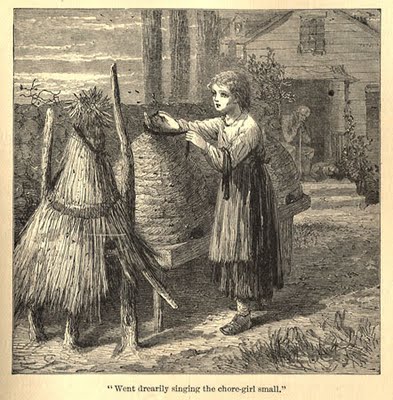
From Whittier and Whittier-Land, eds. Donald C. Freeman, John B. Pickard, Roland H. Woodwell. Courtesy of the Trustees of the Whittier Homestead, Haverhill, MA.
As I was buzzing about the Internet, I also found an English folk band called Telling the Bees. This captivating album cover was created by artist Rima Staines:
For more beguiling bee lore, I suggest Bees in America: How the Honey Bee Shaped a Nation by Tammy Horn.













































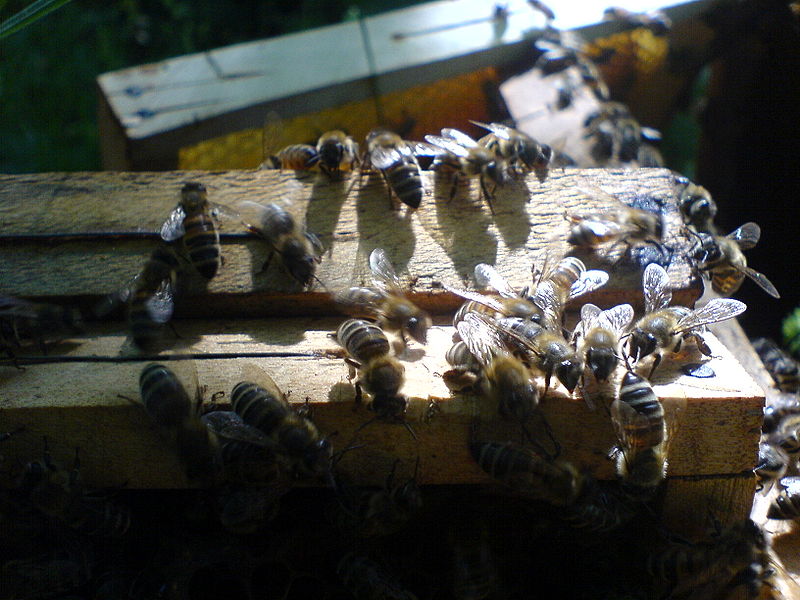
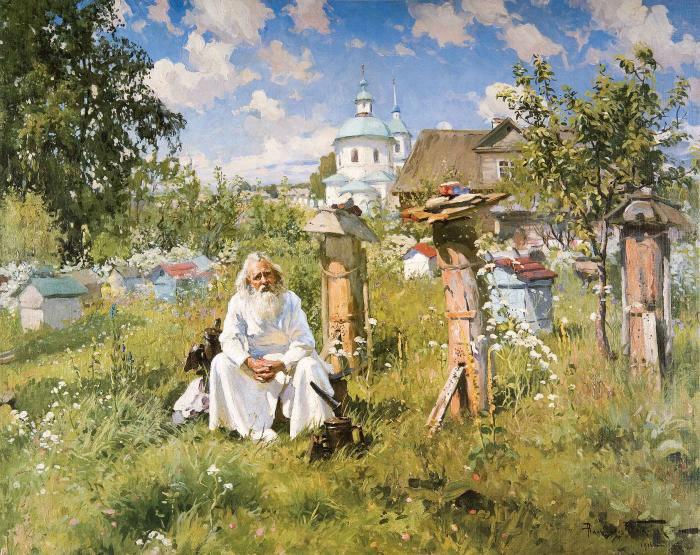
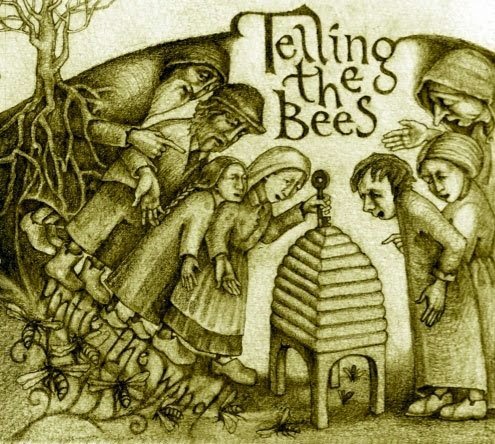
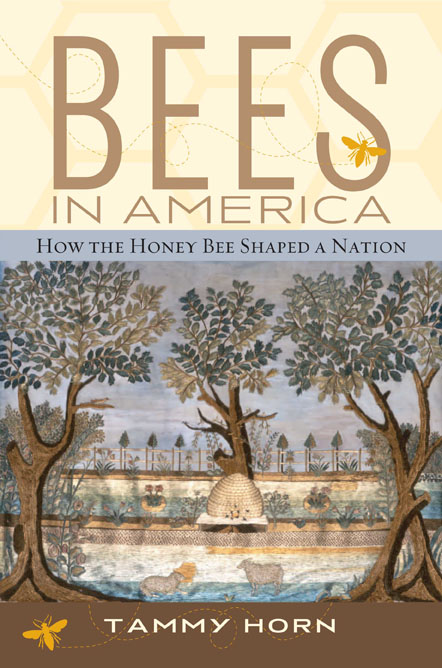








This is fascinating. The more I learn about bees, the more I am astounded at their importance and impact on our everyday lives. This book looks quite interesting and I am going to look for a copy to start my 2014. Apparently, there are more important lessons to learn about life from the bees that I need to know!
Since my former brother in law was a beekeeper, he always told the family about such charming customs and lore of the bees. Very touching . Who pray tell, will tell the bees about their future untimely demise from “Colony Collapse Disorder” and pesticides that are decimating their numbers ?
I’ve ordered a new hexagonal beehive for next summer. I fully intend to chat with its inhabitants and apologize for the pesticides they’re ‘not always’ enduring. Hard stuff indeed.
Didn’t mean to sound so negative ! On a lighter note, the greatest gift I received this past year was a pint of Appalachian Sourwood Honey. It was gathered by an old time mountain man in North Carlolina who has to station his hives only there under the nearly extinct sourwood trees deep in the woods. Otherwise the bees will go to other flowers and it won’t the the “real deal”. It is a pure white honey, and doesn’t look like any other that you have seen. This honey is so rarified and wonderful that it is listed in the Ark of Taste of Slow Food USA which describes the Ark as “a catalog of over 200 delicious foods in danger of extinction.” It was described thusly :” Most honey is made by bees. But sourwood is made by bees and angels.” – Carson Brewer, writer. Here is a link to Slow Foods description of Sourwood Honey :
http://www.slowfoodusa.org/ark-item/sourwood-honey
There are lots of other honeys mentioned on this site as well. Makes you want to try them all !
Bee happy – eat honey! And talk to your bees !
Never heard of white honey before. Some gift!!!!! Definitely touched by angels (and dedicated beekeepers).
HI MaryJane, first of all – Happy New Year! How was your new year’s celebration with the cows and calves? I spent mine with the cats.
I do wish I had more of this precious Sourwood Honey so I could send some to you. I use it in every morning’s cup of tea so there is precious little left. I believe you might find some for sale at the ” Local harvest ” website.
Oh and I’m sure you have read ” The Secret Life of Bees” by Sue Monk Kidd (and the movie is very “sweet” also.)
Thanks for sharing this. We are new beekkeepers and find articles and books about bees and beekeeping very interesting. Bees are so important and we tell people we are saving the world one bee at a time 🙂
Very interesting! I’ll definitely be getting a copy of that book!
Thank you for sharing this book, I’ve been raising 2 bees hives for the last 3 years and lost my hives every winter.
The bees look like this winter they may make it,
I live in town but they give me the touch of farm life I’d love to have , just like your website and magazine helps me dream.
I love this information, thanks so very much for sharing it.
Smiles, Cyndi
I was able to find a copy of the book on amazon and it is headed my way. Can’t wait to dig in and learn more! Thanks Mary Jane for this book review and this thread!
Ah, honey! Just have to have some in my morning tea. A couple of my women’s groups have had beekeepers in at meetings to talk about beekeeping and the threat to the bee’s continued existence. Man (generic) is such a danger to the world around us. Even though I am highly allergic to bee stings (have to carry my EpiPen except during the winter!), I do admire the tenacity and strength of bees. We will really be hurting if colony collapse disorder continues to grow. I was so amazed by the number of women who made remarks about “not realizing how much we rely on bees, etc.” at those meetings. I shake my head at the number of people who still don’t understand where their food comes from and how that inital source has to be protected for future generations.
Since reading The Secret Life of Bees, I’ve been fascinated with the art of beekeeping. A good friend and her husband are now beekeepers and I’ve been promised a trip to their hives with my 2 grand-daughters because I want them to become aware of these wonderful little creatures. Your post is great….interesting facts and pictures.
Hi,
Love your story about the “telling of bees”. You might enjoy knowing that a PBS series “Larkrise to Candleford” (An adaptation of Flora Thompson’s autobiographical novel “Lark Rise To Candleford”, set in 19 century Oxfordshire, England.) had an episode that included a scene where a character named Queenie rushed to her hive to tell them the sad news when she thought that her husband had died.
Bees are wonderful creatures and I thoroughly enjoy my 2 bee hives. It gives you a great appreciation for a teaspoon of honey when you realize how much work went into its production.
In browsing the internet I came across an old newspaper clipping of a gentleman who kept bees for decades. Upon his death, the mourners gathered at the gravesite to find the canopy and bouquet of flowers covered with bees. They weren’t agitated but very docile and calm. Some legends are based on a kernel of truth, however strange it may be.
Depicted in “Larkrise to Candleford” television series very touchingly.